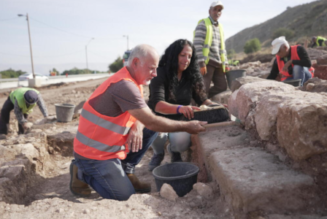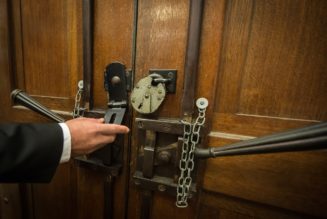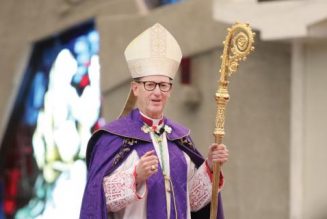Happy Friday friends,
And a very happy feast of St. Mary Magdalene. Disputed traditions identifying her as the penitent woman who anointed Christ’s feet to one side, Mary was among the women who came to the empty tomb on the first Easter. And she was the first to see the risen Lord.
I have occasionally heard Mary Magdalene described as “the first Catholic journalist” because she brought the news about Christ to the disciples. This is, of course, nonsense. By this definition of “Catholic journalism” St. John the Baptist wins by some years.
But more than the obvious factual inaccuracy, it’s the professional narcissism that annoys me. It tries to elevate our trade by trivializing what Mary really was — the first evangelist to announce the Gospel, the Good News, that Christ has risen indeed. This isn’t a piece of information she relayed dispassionately, it was — is — a witness to a revelation which unlocks the salvific history of creation.
Being a journalist is, practiced properly, honest work in the service of truth, whatever the story. Evangelizing is the proclamation of the miraculous incarnate love of God which has conquered death; it is to proclaim the truth with the conviction which comes from how it has changed your life first.
Knowing the difference between the two is, for me anyway, a useful reminder that, however seriously I take my day job, at my judgment Christ will ask me first if I proclaimed the Gospel.
Following the one-year anniversary of the promulgation of Traditionis custodes, the Archdiocese of Washington will announce this morning Cardinal Wilton Gregory’s policy for the ongoing celebration of the Extraordinary Form of the liturgy in the capitol see.
It also requires priests who want permission to say the old Mass to affirm, in writing, “the validity and legitimacy of the liturgical reform dictated by the Second Vatican Council and the Magisterium of the Supreme Pontiffs.” Also among the provisions of the seven-page document is Cardinal Gregory’s requirement that the clergy of Washington to ask his permission if they wish to say the Ordinary Form of the liturgy ad orientem.
You can read all about the policy here.
One thing I found noteworthy: While the policy was, according to Gregory’s accompanying letter, developed with “input from the faithful who celebrate the Mass according to the liturgical books issued prior to 1970,” the policy text itself bears a striking resemblance to the norms issued by Cardinal Cupich of Chicago.
Paragraph 5 of the Washington policy, for example, appears almost identical to paragraph 6 of the Chicago policy for a stretch of some 100 words.
It’s possible that other sections were written with input from D.C. Catholics.
Or, I suppose, it’s possible that the local faithful of the two archdioceses helped their shepherds arrive separately at near identical conclusions. If so, it’s a remarkable occurrence. Perhaps this is what synodality in action looks like.
—
Pope Francis this morning issued a new motu proprio changing the governing law of Opus Dei. The new letter, Ad charisma tuendum, transfers Vatican oversight of Opus Dei to the Congregation for Clergy from the Congregation for Bishops, in line with the provisions of the new curial constitution, Praedicate Evangelium.
Most significantly, Francis announced that the head of Opus Dei will no longer be a bishop. This change, the pope said in his letter, is “intended to strengthen the conviction that, for the protection of the particular gift of the Spirit, a form of governance based on charism more than on hierarchical authority is needed.”
The Opus has always been an unique institution in the Church, ever since they were erected in 1982. It is the only personal prelature that currently exists in canon law, and it was created just a year before the new Code of Canon Law was promulgated.
Legally not really fish or fowl, where the Opus fits in the structure and mind of the Church has been the subject of debate among canonists for 40 years. Canonically, it sometimes seems to quack like a diocese, more than swim like a group formed to distribute priests and deacons around the world for “particular pastoral or missionary works.”
Pope Francis’ new letter aims to keep the prelature close to its mission, and the mind of the 1983 Code of Canon Law. As it happens, all this was the subject of JD’s thesis and it’s kind of, you know, his thing. Ironically, he’s supposed to leave for vacation this morning.
We’ll have more on this story later, with apologies to Mrs. Flynn.
—
The Diocese of Savannah also published its implementation of Traditionis custodes this week, though it was noteworthy in that Bishop Parkes relied on “permissions” from the Vatican to allow the Extraordinary Form to continue in two diocesan parish churches for one year.
As I wrote in an analysis on Wednesday, it’s not clear at all that Bishop Parkes needed Rome’s permission to dispense from the norms of Traditionis custodes to make this accommodation, though the Dicastery for Divine Worship has certainly said they are willing to be asked — other bishops have cited their ordinary legal authority to dispense from universal law in the light of their own pastoral discernment.
The question at the heart of the different approaches is whether Rome has expressly reserved the power to dispense from Traditionis to itself, and there is no clear legal answer.
Given that the dicastery hasn’t (yet) challenged bishops who have chosen to act on their own authority, it’s possible they are allowing dioceses to ask them for “permission” as a kind of buck-passing option, letting Rome play the “bad cop” on request. We’ll likely know more in the next few months.
Calling what is happening to Christians in Nigeria “persecution” doesn’t really capture the reality. Christians there aren’t just being socially marginalized, or discriminated against. They are being killed, with brutal, unrelenting, metronomic regularity.
Fr. Cheitnum did not escape. After the abduction, the kidnappers forced the priests to run with them from the rectory cross country. They were concerned that Fr. Cheitnum was not fast enough, and he might slow the group down enough to be caught. So they shot him.
His body was left in the field where it fell.
These kinds of kidnappings of priests have become so frequent that for the people who do follow what is happening to our fellow Catholics in Nigeria, perhaps the attacks have begun to all run together. Do not let them.
Fr. Cheitnum had parishioners, brother priests, friends. Fr. Justine John Dyikuk, our Nigeria correspondent spoke to them. They remember him as “an ever smiling, humorous, and dedicated priest of God.”
Please read about Fr. Cheitnum, remember his face and his name, and pray for Nigeria.
Away from the Latin Church, a different liturgical dispute has been raging for decades, and it makes the furor over the Extraordinary Form look like a tempest in a thurible. Proposed changes to the Syro-Malabar Catholic Church’s liturgy have led to hunger strikes, the burning of cardinals in effigy, and fighting in the streets.
The Syro-Malabar Church is the second largest of the 23 self-governing Eastern Catholic Churches, and traces its origins back to St. Thomas the Apostle, who according to tradition evangelized India after the resurrection.
Look, I really, really want to nutshell this for you in a way that will make you click this link. But I don’t know where to start.
This was the first story idea Luke Coppen pitched when he started at The Pillar and I was hooked then, and it’s maybe my favorite thing we’ve published yet.

The is a long read, deeply sourced, fascinating look into a moment of drama in a part of the Catholic communion you may know nothing about, but really you should.
If you are looking for a great weekend read, this is it.
If you want to learn something new, this is it.
—
Today we published the continuation of Charlie Camosy’s conversation about gender, sex, and identity with Abigail Favale and John Grabowski. And part two is every bit the vital conversation that last week’s was.
It’s not an exaggeration or a “Twitter thing” to say you can find yourself very quickly in personal and professional trouble for running afoul of the conversation about transgender issues in our society, and that makes talking about these things coherently difficult — risky even.
Here’s a sample:
“There is validity in recognizing gender as culturally informed variation in expressing biological sex. Different cultures and different historical moments have diverse expectations for what it means to live out the reality of being a boy or a girl, a man or a woman, and that’s okay. Most of these cultures also have some room for individual variation.
What we can’t do is introduce a hard separation between the sexed body and this cultural expression. That is exactly what gender ideology calls for—a disconnect or hard separation between a self-articulated gender identity and the body.”
…
“Catholic institutions can’t just say ‘no’ to gender identity theory. They also have to articulate a positive vision of human personhood and commit to a path of accompaniment with people who experience gender incongruence.
In response to “gender affirmation,” we must offer whole-person affirmation. We must clearly and emphatically and repeatedly affirm the belovedness of each human person: you are infinitely loved. Everyone needs to hear this. We also need to affirm the goodness and gift of the human body, even in the context of physical suffering and limits, which signal our interdependence on one another and our ultimate dependence upon God.”
Read this week’s conversation here. It’s a conversation worth reading in full, and you catch up on part one here.
The Vatican put a shot across the German synodal bow yesterday, releasing an unsigned statement in apparent response to the Teutonic plans for a kind of permanent synodal super-committee to oversee the Church (and bishops) in that country.
Of course, previous interventions from Rome have been pointedly ignored by the German bishops and their “synodal way.” So why release a statement now, and what does Rome hope will happen?
—
Also this week, the Vatican announced a new centralization of all curial investments, and a new ethical investment policy in line with Church teaching.
Many people might wonder why such a policy needs to be spelled out in the Vatican at all, and if it must, why it wasn’t in place years ago. I took a look at those whys, and asked whether this will do anything to actually reform the way the curia does business.
You can read it here. Spoiler alert: I have some doubts.
—
A final Roman news item I want to flag for you on the Vatican-China diplomatic front: the Vatican has filled senior diplomatic posts in Taiwan and Hong Kong.
On Tuesday, Italian media reported that Msgr. Stefano Mazzotti is the Vatican’s new interim chargé d’affaires in the nunciature in Taiwan and Msgr. José Luis Díaz-Mariblanca Sánchez is being sent to its Hong Kong Study Mission.
Why does this matter? Well, as I have repeatedly flagged in these newsletters, the Vatican-China deal has been a raw one for Rome, increasingly by all accounts, but the Holy See’s diplomatic ties to Taipei are about the only bruise in Beijing it can hit.
Filling the roles suggests, at least, that even if the Vatican can’t walk away from its bad deal, it isn’t looking to double down and push for full diplomatic ties with China. Stay tuned.
As the new debate about abortion laws continues to shake out, the rhetoric continues to get more extreme. Along with it, the examples being cited in defense of abortion are getting more extreme, too.
A lot of media coverage recently has focused on the case of a 10 year-old girl who became pregnant after being raped, and was taken across state lines to have an abortion, and the arguments for and against exceptions on abortion bans for rape and incest.
Understanding where a clear majority of Americans are on abortion bans, and capturing that support to end the vast majority of abortions committed in this country would seem, to me anyway, like a pretty clear path to saving lives in the short term, and driving the public debate to where it needs to be: on what abortion is, and what it does to a real, identifiable, innocent human life.
That’s the conversation that changes minds, and laws. It’s also, of course, the conversation the pro-abortion lobby doesn’t want to happen.
—
This week, Vice President Kamala Harris made a minor splash by insisting during a speech that supporting legal abortion, which she believes should include abortion up until birth, “does not require anyone to abandon their faith or their beliefs.”
It’s become something of a running theme in her statements on abortion since the Supreme Court’s decision last month, and many commentators of all confessions have rightly called it out as the nonsense it is.
Harris is, of course, famously as hostile to religious belief as she is ignorant about it. As a senator, she was wont to grill Catholic judicial candidates about their membership of the Knights of Columbus, which she deemed a sinister sexist plot of the Catholic patriarchy.
It’s true that the pro-abortion lobby have elevated their choice of speakers to a kind of absurdist performance art; this was the same week they sent a dilettante British princeling to the UN to read America a lecture on democracy and constitutional law in support of the cause. But, on balance, I doubt Harris leading a charge to win over religious people for abortion by sheer force of personality was a strategic choice— if I am reading the polls right, the vice president is only slightly less popular than norovirus on a cruise ship.
No, I think the Veep’s comments are about closing minds, not changing them.
Insisting that there’s no religious reason not to support legal abortion is about conditioning “pro-choice” people to think that anyone expressing religious qualms about it is either a fanatic or a charlatan.
That’s an important tactic because, again looking at the polling, most people, including pro-choice people, favor significant limits on abortion. The last thing the pro-abortion camp wants is for the actual majority in this country to start talking to each other and realizing who they are and what they agree on. If they did, we’d save a lot of lives.
Finally, it’s been hot all over this week, but it has been especially warm in the UK, where temperatures reached 104° Fahrenheit (40°C to normal people).
While this isn’t really all that unusual for a lot of other places, because Britain’s national infrastructure is actually constructed entirely out of a delicate, flaky, shortcrust pastry and Heinz Salad Cream, things got a bit apocalyptic: railway lines buckled, airport runways melted, fields spontaneously combusted.
You’d expect chaos to ensue. And if this had all happened to a less mature country, like France, it would have.
But Britain is a nation held together by the unflappable practicality of the average citizen. The sort of man who, faced with 100° heat and no air conditioning, fills his rubbish bin (garbage can, if you prefer) with water and gets in with a drink. The sort of man who is much more annoyed by an idiot neighbor’s unsolicited opinions than by the weather.
This sort of man. My kind of guy.
See you next week,
Ed. Condon
Editor
The Pillar
Join Our Telegram Group : Salvation & Prosperity












